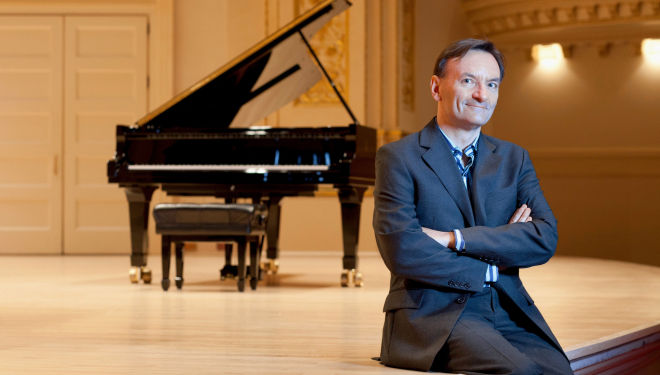
Booking is open to Barbican Members on the 28th January 2015.
Stephen Hough has an illustrious musical background. A finalist in the BBC Young Musician scheme before winning the Terence Judd Award and the Naumburg International Piano Competition, he now stands at the forefront of British romantic music, with over fifty recordings. Gramophone voted his version of Saint-Saëns’ piano concertos the finest album in thirty years, and live reviewers have noted his eloquence, clarity and ability to find lyrical potency in the knottiest of compositions.
Hough’s recital at the Barbican Hall will centre around the world premiere of his own Sonata No. 3, a work composed to celebrate the 175th anniversary of the international Catholic magazine The Tablet. Hough, himself a committed Christian, is sure to have crafted a work of spiritual potency.
But that’s not all – the new piece will be accompanied by masterpieces from three composers whom Hough believes to echo his religious concerns - Schubert, Liszt and Franck. The former’s Piano Sonata No. 14 (1823), one of his final works for the instrument, is one of the most tragic in the repertoire. Franck’s Prélude, Chorale and Fugue (1884), originally written for organ, is a prime example of the composer’s distinctive cyclic style. After Liszt’s astonishingly proto-modernist Valse Oubliées No. 1 & 2 (1881-4), the evening closes with No. 11 & 10 of his Transcendental Études (1852), rhapsodic studies that respectively push harmony and melody to their extremity.
Stephen Hough has an illustrious musical background. A finalist in the BBC Young Musician scheme before winning the Terence Judd Award and the Naumburg International Piano Competition, he now stands at the forefront of British romantic music, with over fifty recordings. Gramophone voted his version of Saint-Saëns’ piano concertos the finest album in thirty years, and live reviewers have noted his eloquence, clarity and ability to find lyrical potency in the knottiest of compositions.
Hough’s recital at the Barbican Hall will centre around the world premiere of his own Sonata No. 3, a work composed to celebrate the 175th anniversary of the international Catholic magazine The Tablet. Hough, himself a committed Christian, is sure to have crafted a work of spiritual potency.
But that’s not all – the new piece will be accompanied by masterpieces from three composers whom Hough believes to echo his religious concerns - Schubert, Liszt and Franck. The former’s Piano Sonata No. 14 (1823), one of his final works for the instrument, is one of the most tragic in the repertoire. Franck’s Prélude, Chorale and Fugue (1884), originally written for organ, is a prime example of the composer’s distinctive cyclic style. After Liszt’s astonishingly proto-modernist Valse Oubliées No. 1 & 2 (1881-4), the evening closes with No. 11 & 10 of his Transcendental Études (1852), rhapsodic studies that respectively push harmony and melody to their extremity.
| What | Stephen Hough, Barbican Hall |
| Where | Barbican Centre, Silk Street, London, EC2Y 8DS | MAP |
| Nearest tube | Barbican (underground) |
| When |
On 27 Oct 15, 7:30 PM – 10:00 PM |
| Price | £10-25 |
| Website | Click here to book via the Barbican website |




